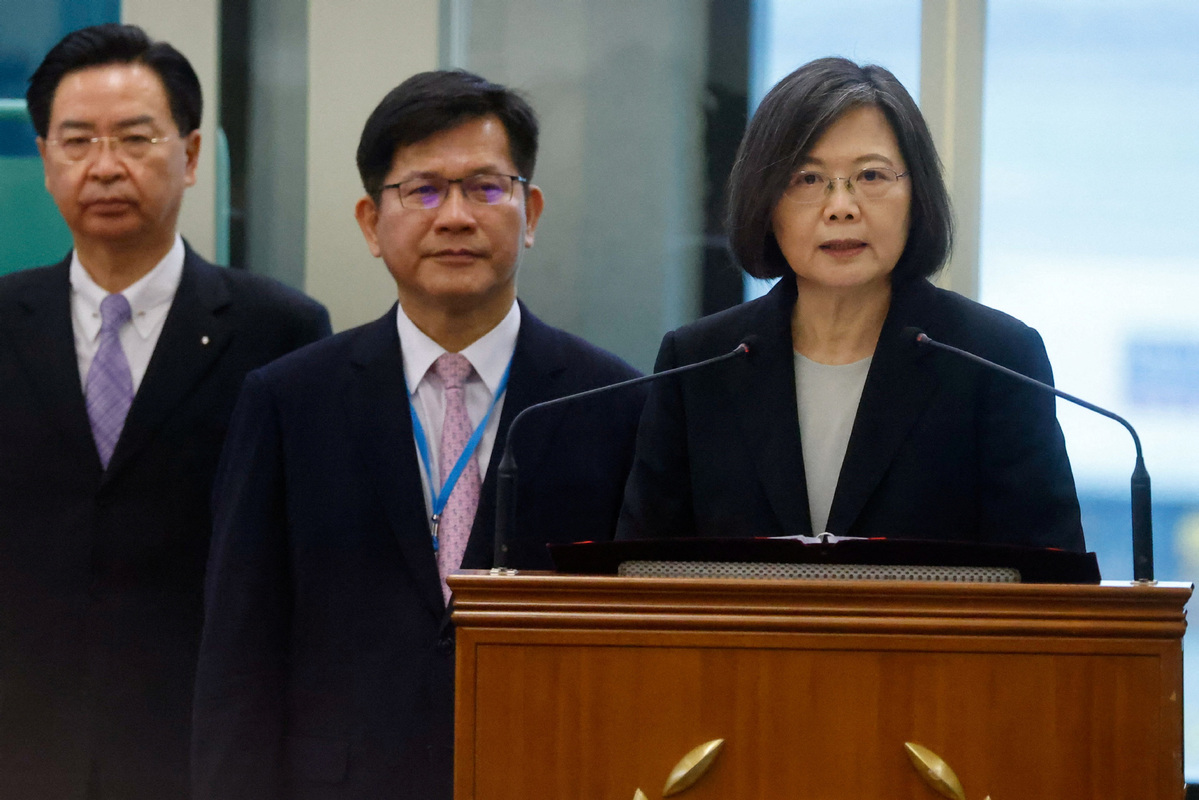Commitment not a case of semantics


The transit of Tsai Ing-wen, leader of Taiwan island, through the United States en route to Guatemala and Belize, is nothing but a selfish and reckless political gamble. Such an arrangement between the US and the Taiwan authorities poses a severe challenge to the one-China principle inscribed in the three Sino-US communiques.
It is a given fact that Taiwan is a province of China. This fact is recognized by countries across the world including the US. China made the one-China principle a precondition for the establishment of diplomatic ties with the US. In response, Washington solemnly pledged in the Joint Communique on the Establishment of Diplomatic Relations between the People's Republic of China and the United States of America (Joint Communique) that: "The United States of America recognizes the Government of the People's Republic of China as the sole legal Government of China. Within this context, the people of the United States will maintain cultural, commercial, and other unofficial relations with the people of Taiwan."
Therefore, the US is obligated to honor the commitment of maintaining only unofficial relations with the people of Taiwan. Specifically, it should not accord any official from the Taiwan province special treatment that is otherwise inaccessible to the ordinary people of Taiwan. Unfortunately, the US has often been found to circumvent its obligations and commitments, either on the pretext of providing humanitarian convenience for senior officials of the island on their way to or from Central American countries or by citing the uncertain international status of Taiwan.
The inclusion of the US' unofficial relations with Taiwan in the communique, in fact, reinforced the fact that the US was obligated to respect the dignity of the government of the People's Republic of China which is the sole legal representative of China, just as it does to the governments of other countries with which it has diplomatic relations.
Some US officials refer to a paragraph in the joint communique, which reads: "The Government of the United States of America acknowledges the Chinese position that there is but one China and Taiwan is part of China." They claim that it is the Chinese position that there is but one China and Taiwan is part of China, and the US merely admits the existence of the Chinese position. The US side tends to offer its own understanding of the term "acknowledge", but in the eyes of China, "acknowledgement" is no different from "recognition".
It is clear that the US side is using semantics to confuse the international community. Any sane person will acknowledge that in the likelihood of the US later denying Taiwan's status as part of China, no joint communique would have been prepared, let alone signed. Also, the misinterpretation of the Sino-US agreement by some US politicians would not only threaten China's sovereign interests but also harm the overall interests of the American people.
As a matter of fact, some US politicians' position in this regard does not hold. The joint communique has two versions, one in English and the other in Chinese. Both versions are authentic and legally binding. Under the customary international law on treaty interpretation, when one version of a single treaty allows two interpretations, the other version of the treaty must be referred to for ascertaining the true meaning of the treaty.
In the Chinese version of the above paragraph from the joint communique, the Chinese word chengren must be undisputedly interpreted as "recognition" in English. Therefore, the US commitment in this regard is clear: The government of the US recognizes the Chinese position that there is but one China and Taiwan is part of China.
And since the US recognizes the Chinese position, allowing Tsai Ing-wen to transit through the US is nothing but a violation of the joint communique and the one-China principle which the US has pledged to follow. The US government should stop such unlawful and provocative moves.
It should also be clear to the US that China, according to international law, is entitled to take countermeasures against such a violation. And the Chinese government is empowered by China's laws to take necessary measures, including imposing sanctions on the people responsible for such a violation.
The author is dean of the School of International Law, China University of Political Science and Law. The views don't necessarily reflect those of China Daily.
If you have a specific expertise, or would like to share your thought about our stories, then send us your writings at opinion@chinadaily.com.cn, and comment@chinadaily.com.cn.


































